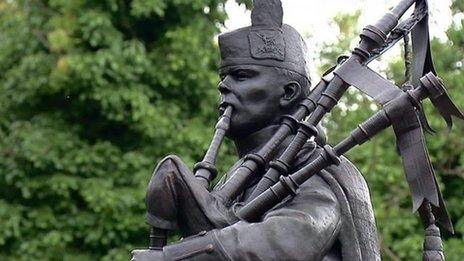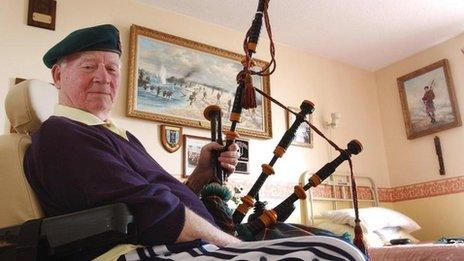'Lost' WW1 bagpipe tunes researched
- Published

A bronze statue commemorating the hundreds of pipers and drummers who lost their lives in conflict was unveiled in Edinburgh in September
A research project aims to uncover long-forgotten music composed by pipers in the killing fields of the First World War.
Several of today's best known bagpipe tunes, such as Battle of the Somme and The Bloody Fields of Flanders, were written in the trenches.
But many more pieces are thought to have been forgotten once the war ended.
Of the 2,500 pipers involved in the Great War, some 500 were said to have been killed and a further 600 wounded.
The losses were so great in the early stages of the war that the tradition of them leading Scottish regiments into battle was reputedly banned by the War Office.
But the practice continued regardless, and the skirl of the pipes echoed across battlefields throughout the conflict.
The Scottish Piper's Association has been given £7,500 by the Heritage Lottery Fund to study the lives of the pipers and the music they played.
The association's vice president, Hugh Anderson, told the BBC's Good Morning Scotland programme that pipers had played an extremely important role during the war.
He explained: "They helped the men by playing while they were marching, they roused the men into battle and then in the evening they would entertain them by playing the pipes.
"They were always on the frontline, they were always there to get the men over the top and into battle.
"They composed hundreds of tunes, mostly to do with battles or people or places. Quite a lot (of these tunes) are here today, but we are going to try and research the ones that are not heard today.
"We are going to be putting on five recitals, with some of the top pipers of today playing the tunes that were composed back then."
The project, which was launched at the Erskine Veteran's hospital, will use records from libraries, newspapers and regimental museums.

Bill Millin, who died in 2010, was the only piper to play at the D-Day landings
Among the pipers who served in the trenches was Sergeant-Piper Daniel Laidlaw, an experienced soldier who volunteered to rejoin the army at the outbreak of the war.
Laidlaw won the Victoria Cross, Britain's highest military honour, for his bravery at the Battle of Loos on 25 September 1915.
His citation read: "During the worst of the bombardment, Piper Laidlaw, seeing that his company was badly shaken from the effects of gas, with absolute coolness and disregard of danger, mounted the parapet, marched up and down and played the company out of the trench.
"The effect of his splendid example was immediate and the company dashed out to the assault. Piper Laidlaw continued playing his pipes until he was wounded."
Laidlaw survived the battle and the rest of the war and died, aged 74, in 1950.
But possibly the most celebrated Scottish military piper was Bill Millin, a commando who played his comrades ashore on Sword Beach during the D-Day landings in World War Two.
He had been asked to do so by his commanding officer, Lord Lovat, who was said to have instructed Millin to ignore the War Office's ban on piping.
Lovat reputedly told Millin: "That's the English War Office. You and I are both Scottish, and that doesn't apply."
A bronze statue commemorating the hundreds of pipers and drummers who lost their lives in conflict was unveiled in Edinburgh in September.
- Published20 November 2013
- Published27 September 2013
- Published18 August 2010